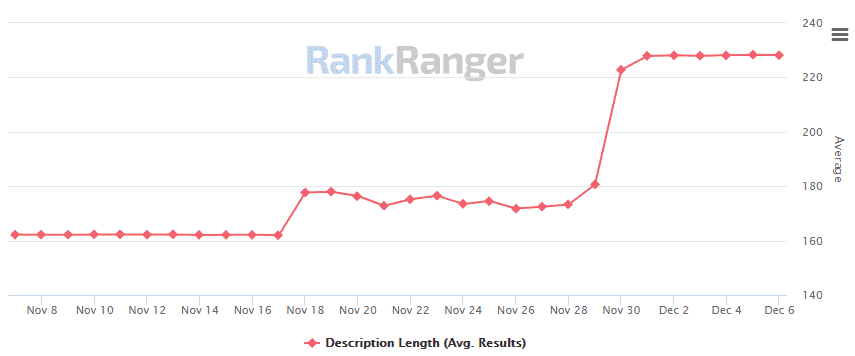Last Updated on January 11, 2018 by Mike
It has been recently reported by Search Engine Land, Search Engine Roundtable and other sources that Google has been moving towards displaying longer search snippets in their results pages. We’re here to answer questions about these updates and the impact of these changes.
What is a Search Snippet?
A search snippet can be any description accompanying a piece of information in a Search Engine Results Page (SERP). Snippets are often displayed in answer box and knowledge graph results and can include a wide range of information including reviews, prices and ratings. In this case, we are referring specifically to the blocks of black text displayed below the webpage title link results in a Google SERP (the top 10 results).

When did this update take place?
The truth is that Google constantly tweaks and experiments with any and all information displayed in their SERPs. However, RankRanger, which tracks changes in Google SERPs, reports seeing a noticeable change in average snippet length starting on November 18.
How much longer are the snippets?
Traditionally Google has displayed roughly 160 characters of black text below the blue webpage link, or about two lines of text. The average length has changed from around 162 characters on November 17 to 228 characters on December 1. With these changes, many results have three to four lines of text. The longest snippets are around 330 characters – more than double the traditional length.

Are all snippets longer?
No. On average description snippets are longer, but not all snippets have changed. Google is selectively displaying longer snippets for certain results.
What information is displayed in the longer snippets?
Traditionally the SERP snippet accompanying a link to a webpage is the page’s meta description. This update affects content that is visible on a webpage, which is used in the search snippets section. So if a person traveling in Paris searches for “Eiffel Tower opening hours” and a travel article on the Eiffel Tower has information about opening hours, Google may pull information from that paragraph instead of using the webpage’s meta description.



This is not new – For the past decade or so, Google has experimented with using content from a webpage as the snippet instead of the meta description if the meta description does not accurately match the search query. The difference is that Google is pulling more of this on-page information than it has in the past.
What types of searches are seeing the longer search snippets?
All types. I was surprised to find that both commercial and informational search queries see the long search snippets in SERPs. Take the example “types of Christmas trees” and “Christmas trees for sale”. Similar searches but with different user intent – one person is likely searching for shopping locations or websites that sell Christmas trees and the other person is not shopping but trying to find in-depth information.





The point is, this affects all types of webpages. Both information and commercial.
Will these changes impact my website’s traffic?
If Google is displaying pages of your website with longer than typically search snippets, you may be benefiting from a higher Click Through Rate (CTR), as your website’s search result will take up more SERP real estate than it did in the past. Google is still in the testing phase of this update, and the length of your webpage’s descriptions will likely vary by the day and based on the search query used.
What should I do about this change?
This update underlines the importance of having unique and descriptive content on all pages on your website – particularly high priority pages like product and service pages. Google is likely still in testing mode, but it shows that they believe the best information to display in their search results may come from the content on a webpage. Focusing on improving on-page content can include making sure your content is:
- Unique – The content does not appear on other pages throughout your website.
- Descriptive – As long as it does not harm user experience, longer and more detailed content is better for SEO.
- Properly structured – Making use of headers (H2, H3, & H4s) helps organize pages with lengthy content and makes it easier for search engines to categorize the content.
Should I rewrite my meta descriptions?
At this time, no. It does not make sense to start writing longer meta descriptions. Google is using body copy text from webpages for these lengthier snippets – not meta descriptions. A character limit of 150-160 for meta descriptions is still a good length. It’s a good idea to check to see how the length of your meta descriptions will be displayed in search results for both desktop and mobile users. Spotibo provides a great meta description length checker that does just that – check it out!
Having any other questions about these updates? Feel free to ask us!

Leave a Reply